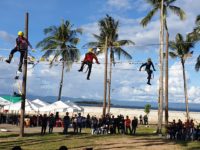A bigger share of electrification projects slated for 2018 will go to unenergized communities of Mindanao to bolster development in the region, state-run National Electrification Administration (NEA) announced Tuesday.
Administrator Edgardo Masongsong said a P1.817-billion budget has been allotted to provide electricity to 1,817 sitios across the country this year. Of this target, majority are located in Mindanao with 705 sitios, followed by Luzon with 560 sitios, and Visayas with 552 sitios.
“The government’s electrification policy is always cognizant of, and responsive to, the situation on the ground. Despite the best efforts of government, in partnership with electric cooperatives, a large chunk of Mindanao remains unelectrified. This is precisely the reason Mindanao gets the lion’s share of the government’s funds aimed at extending electricity services to the unserved areas,” Masongsong said.
During the Senate hearing on Monday (April 16) into the status of electrification in the country called by the Senate Committee on Energy, the NEA said there are 19,740 sitios that remain without electricity. Majority of these unenergized sitios are found in Mindanao (8,535), then Luzon (6,541), and Visayas (4,664).
Masongsong said about P25.352 billion would be needed to fully energize the remaining sitios within the term of President Rodrigo Duterte, adding that the average cost to energize a sitio is P1.4 million.
The NEA chief also cited key challenges in the implementation of the Rural Electrification Program, such as isolated areas, difficult terrain, right-of-way issues, peace and order problems, natural calamities, and administrative constraints.
To address the gap in electricity access, the NEA proposed some measures including the issuance of an executive order aimed at accelerating the energization of unserved, underserved and unviable areas; and amendments to the existing department circular on Qualified Third Party (QTP) policy.
The agency also proposed the continued subsidy for Sitio Electrification Program (SEP), Barangay Line Enhancement Program (BLEP) and Household Electrification Program, and streamlining and simplifying the administrative requirements and processes, such as permits and clearances.
Meanwhile, Sen. Sherwin Gatchalian, chairman of the Senate Committee on Energy, directed the Department of Energy (DOE), the NEA, the Energy Regulatory Commission (ERC), and the National Power Corporation (NPC) to come up with a unified strategy for household-level electrification.
Gatchalian recently filed Resolution 695 directing the appropriate Senate committee to conduct an inquiry, in aid of legislation, on the status of electrification in the country “to assess and possibly revise the national electrification strategy, with the end view of achieving total electrification for the welfare of the Filipino people and the development of the nation.”
Under SEP Phase 2, the NEA and the electric cooperatives (ECs) have completed the energization of some 1,474 sitios while 409 more are nearing completion. About 563 sitios were given electricity in Mindanao, 439 sitios in Luzon and 472 sitios in Visayas.
Since inception, the Rural Electrification Program through the NEA and partner ECs successfully energized 78 provinces, 90 cities, 1,385 municipalities, 36,051 barangays, and 121,324 sitios benefiting 12.186 million households or almost 60 million Filipinos as of December 2017.




